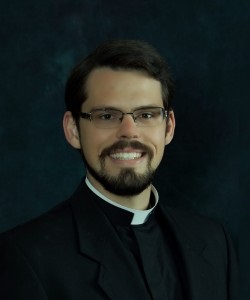By: Deacon Alexander Albert, Seminarian, Diocese of Lafayette
“He threw stones at David… he was always bruising himself with stones… And as they were stoning Stephen… he cried out… ‘Lord Jesus, receive my spirit…’ ‘he who is without sin cast the first stone.”
So, why does Scripture love to throw stones into its stories? Why? Because you’d have to be stupid as a stone to commit even a tiny sin in the face of the almighty, all-loving God. And yet, that is exactly what we do.
And how does God answer these stupid sins? Many people imagine that God’s justice is like a lightning bolt from heaven, but in reality, his Justice is written into the very ways of nature, even if it’s been obscured by creation’s fall. When committed, sin will generate its own punishment in external enemies, as in the case of David, or, perhaps even worse, in interior disunity, as with the man in the Gospel. Divided by 1000 sins their 1000 demons, this man beats himself daily with the fruits of his sin and only gets worse.
Is it any surprise, then, that God commanded stoning as a punishment for serious sin? And yet, what is the difference between David and the Demoniac? Repentance. Repentance and it’s fruit, humility. This is the difference between the Divine and the Demonic. Stones that strike the flesh of a humble who admits his fault and accepts his punishment produce healing, as we see with David’s return to Jerusalem. In a strange irony, the proud rejection of repentance and punishment lead to self-inflicted punishment and fruitless pain.
But, is there not another Divinely-Defined use for these stones of our stupid sin? Indeed, Jacob and many others use stones to build an altar upon which they can offer a pleasing sacrifice. In Exodus 20, God commands that altars be built of uncut stones. It’s as if God is saying that only thing you have to offer in sacrifice, the only thing which is truly yours, is your sin, uncovered, uncut, unpolished. Truly, the word in Hebrew for “sin offering” is more literally just “sin.”
David allows Shimei to cast his stones and embraces his punishment, but Shimei pays for it in the end. In his thirst for justice, he himself became its victim. Christ, however, answers sin in a better way. The sheer presence of his merciful love sets the stone-slinging legion of demons to begging. Christ grants their request and sends the unclean spirits into unclean swine, who promptly hurl themselves to their deaths. Sin and evil will destroy itself, all we have to do is let it go.
And this is the power of Mercy – it does not throw stones, but lets them fall where they may, gathers them up, and puts them to the only good use they’ve ever had: Mercy builds an altar with the stones of sin and offers the sacrifice of repentance and forgiveness. The harsh words flung at you by a brother or a betrayer… that shameful sin you use to beat yourself into a bruised despair… the curses you hurl at your enemies, what do they accomplish?
It is the Year of Mercy. Christ said “he who is without sin” may “cast the first stone,” but he said more than that, though he didn’t just use words. He said it when he hung upon the Cross for your sins, for our sins. He who is with sin lay down your stone, build your altar, and offer what the Lord truly desires, the sacrifice of mercy.
About the Author: Deacon Alexander Albert, Seminarian, Diocese of Lafayette

Deacon Alexander Albert was born and raised in Kenner Louisiana. He is an alumnus of Archbishop Rummel Highschool. After Katrina, he attended college at the University of Louisiana, Lafayette and his family moved to Alabama. After a few years of tugging, he responded to God’s call and entered seminary for the Diocese of Lafayette. His homilies and other thoughts can be found here: http://lumenest.blogspot.com/
Disclaimer
All opinions published by the authors on this blog are solely those of the authors. Although the goal is that they should, they do not necessarily express the views and opinions of the Archdiocese of New Orleans, Notre Dame Seminary, the Church, or their respective dioceses and bishops.
Notre Dame Seminary and the Archdiocese of New Orleans are not responsible for the comments of commenters, although every effort will be made to remove offensive comments.
If you should find an error or offensive content, please email the NDS Blog editorial team.

